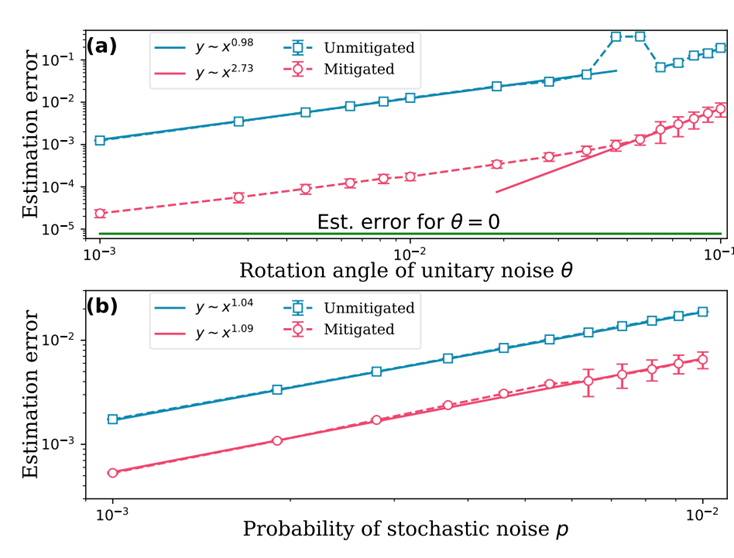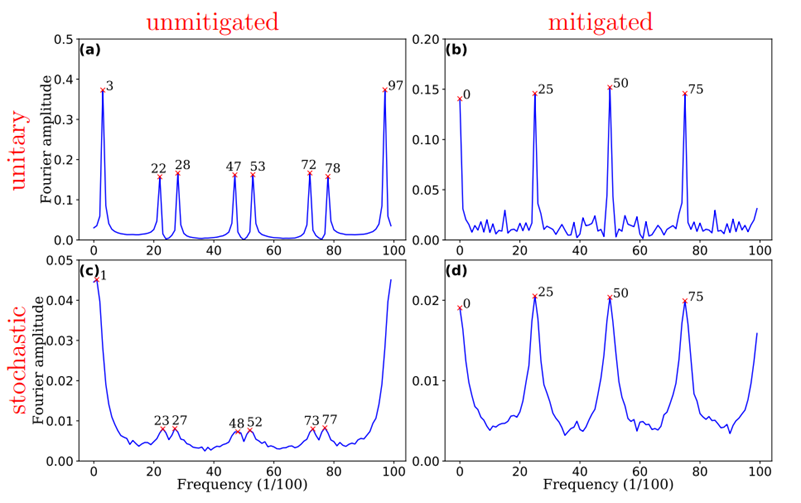Progress Made in Noise-Resistant Quantum Circuit Design by BAQIS Quantum Operating System Group
2023/06/24
Recently, the Quantum Operating System Group at Beijing Academy of Quantum Information Sciences (BAQIS) made significant progress in the design of noise-resistant quantum circuits for quantum phase estimation problems. They proposed a method for efficient error mitigation in phase estimation algorithms that do not require significant resource overhead, paving the way for the implementation of phase estimation algorithms before the arrival of fault-tolerant quantum computing. On June 22, 2023, the research results titled "Noise-resilient phase estimation with randomized compiling" were published in Physical Review Letters.
Quantum phase estimation is a key step in many quantum algorithms, such as Shor's algorithm for factorization, the HHL algorithm for solving systems of linear equations, and the estimation of Hamiltonian energy spectra. However, phase estimation algorithms based on quantum Fourier transform require many auxiliary qubits and need quantum error correction to resist noise. Both of these requirements are difficult to achieve in the current era of noisy intermediate-scale (NISQ) quantum computing. In order to reduce qubit consumption, a phase estimation that does not require a controlled unitary operator was proposed (Figure 1). However, the algorithm is still affected by noise during actual operation. To get meaningful results, it is necessary to develop corresponding error mitigation techniques.

Figure 1. The circuit for control-free phase estimation.
The recently published paper unveils a novel error mitigation method tailored for control-free phase estimation in quantum computing. Researchers have confirmed through theoretical proof that the phases of a unitary operator are immune to noise channels, provided the channels have only Hermitian Kraus operators under first-order correction. This revelation enables the identification of certain benign types of noise specifically for phase estimation. By additionally incorporating a randomized compiling protocol, the team has effectively transformed generic noise in the phase estimation circuits into stochastic Pauli noise. The significance of this transformation is that it aligns with the conditions of their theorem, thereby facilitating a noise-resilient phase estimation without any quantum resource overhead.

Figure 2: The comparison between the novel mitigation results and the those from the standard method, for a problem of Floquet quasi-energy spectrum estimation
The research team conducted simulated experiments to verify the effectiveness of their proposed method. The outcomes demonstrate that their innovative approach can dramatically decrease the estimation error of the phases, with reductions observed up to 2 orders of magnitude. The researchers' pioneering method establishes a path forward for the application of quantum phase estimation, setting a strong foundation that is likely to be essential in the era before fault-tolerant quantum computers become a reality.

Figure 3: The numerical simulation for an order finding problem
Dr. Yanwu Gu, an assistant researcher at BAQIS, is the first author of the paper, while Associate Professor Dong E. Liu at Tsinghua University and a concurrent researcher at BAQIS, along with Dr. Gu, are the corresponding authors. Other authors include Dr. Yunheng Ma and Dr. Nicolo Forcellini, both are postdoctoral researchers in Quantum Operating System Group at BAQIS. This work has been supported by the National Natural Science Foundation of China, the Innovation Program for Quantum Science and Technology, and the Beijing Natural Science Foundation.
Article links:
https://journals.aps.org/prl/abstract/10.1103/PhysRevLett.130.250601
 中文
中文 Email
Email QCloud
QCloud Log in
Log in
